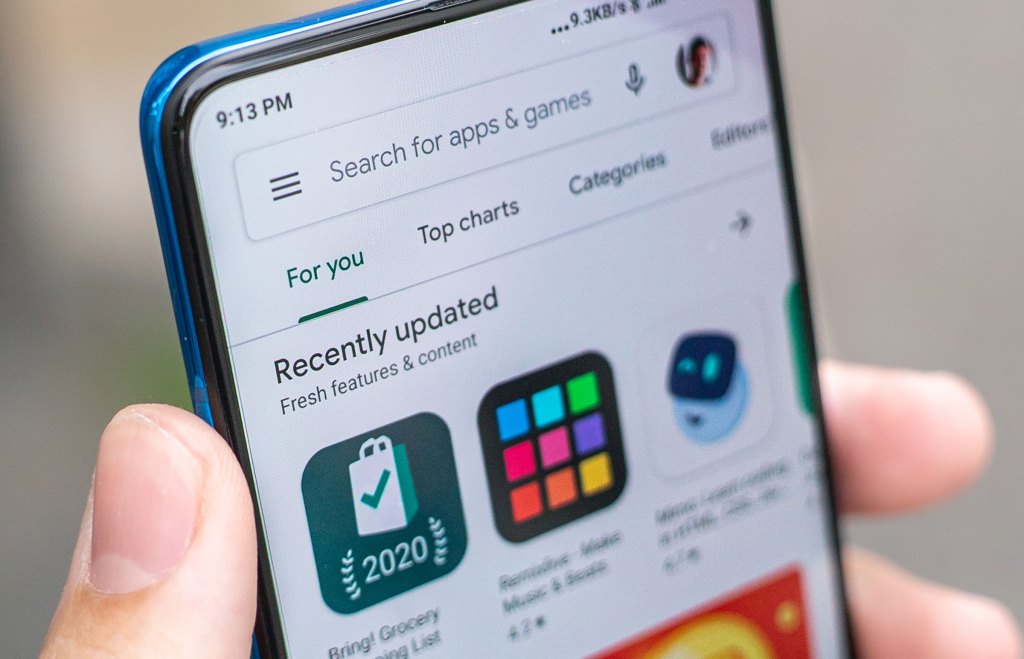Under threat of regulation, Google announced today it’s updating its Google Play billing policies to better clarify which types of transactions will be subject to Google’s commissions on in-app purchases. While the more detailed language doesn’t actually change the earlier policy’s intention, it will impact a percentage of developers who don’t currently use Google Play’s billing system when selling digital goods in their app. In addition, the company announced it will make changes in Android 12 that will make it easier for users to install and use third-party app stores as an alternative to Google Play.
The company says that its current billing policies only apply to less than 3% of apps on Google Play. Of those apps, 97% already use Google Play’s billing library. That means there’s only a small percentage of apps that will need to come into compliance under the clarified terms.
To make the transition easier, app developers will be given an extended 1-year grace period to introduce Google Play’s billing library into their apps, had they previously skirted Google’s policies around digital purchases.
Google will also give some businesses impacted by the pandemic the ability to opt-out of its payment policies for the next 12 months. This could apply to those businesses that had to move their previously physical services online — such as live events.
Apple recently did the same for Facebook’s paid events business on the iOS App Store.
Like Apple, Google collects a 30% commission on in-app purchases.
Google also said it won’t limit developers’ ability to communicate with customers, including about alternative ways to pay — in contrast with Apple. However, the nuances of that decision remain to be seen. [In an FAQ, Google says developers can communicate with users “outside of your app.”)
“To clarify, Google Play does not have any limitations here on this kind of communication outside of a developer’s app. For example, they might have an offering on another Android app store or through their website at a lower cost than on Google Play,” the company noted. “We understand the importance of maintaining the customer relationship. As such, we have also always allowed developers to issue refunds to their customers and provide other customer support directly,” it said.
Bloomberg had previously reported Google was planning to increase its push for a cut of Play Store apps’ in-app purchases.
The policy updates indicate how Google is responding to the increased regulatory scrutiny of its Android mobile platform and how it operates its app store, Google Play. These matters have recently been the subject of antitrust investigations in the U.S. and other markets, where governments are attempting to determine if the current crop of tech giants have been abusing their power by way of anti-competitive business practices.
At issue is the fact that app stores have become the default way — and in some cases, the only possible way — for developers to distribute apps to mobile consumers. But these app stores also commission many of the apps they distribute, even when the platform maker itself offers a competing product. For example, the stores distribute alternative music streaming services, like Spotify, and take a cut of its subscription revenues. At the same time, they also offer their own music streaming service, like Apple Music or Google’s YouTube Music.
In other cases, larger app publishers like Epic Games don’t want to pay app stores for distribution and billing services, as they’re capable of providing the platform and tools for distribution and can bill their customers directly. In Apple’s case, Epic has engaged in a lawsuit over the matter which is still ongoing. A group of developers, including Epic, also last week launched a coalition to demand more “fairness” in the app industry and to fight back against what they perceive to be app stores’ overreach.
Google’s app store business hasn’t received quite the same level of attention as Apple’s because it already offers users the ability to sideload apps. That means users can toggle a setting to install apps hosted outside of the Google Play Store.
In an announcement today, Google also says it will make changes in next year’s release of Android 12 that will make it easier for consumers to use other app stores on Android devices, without compromising Android’s existing safety measures. Google hasn’t said what these changes may include, but one area of concern has been how the Android OS approaches the messaging around sideloading apps.
Today, it presents the option as only a serious security risk that users must manually enable. More recently, it limited sideloading in its Advanced Protection Program, which is designed for high-profile Google users, like politicians or public figures, or those whose accounts could be targeted by hackers, like journalists or political dissidents.
That means reasonably safe alternatives to Google Play have more difficulty acquiring users.
The company said the changes related to third-party app stores were directed by developer feedback.
Google stressed, too, that its policies are applied universally, even to its own apps.
“Our policies apply equally to all apps distributed on Google Play, including Google’s own apps. We use the same standards to decide which apps to promote on Google Play, whether they’re third-party apps or our own apps,” the company said, in an announcement. “In fact, we regularly promote apps by Google’s competitors in our Editors’ Choice picks when they provide a great user experience. Similarly, our algorithms rank third-party apps and games using the same criteria as for ranking Google’s own apps,” it added.































Comment